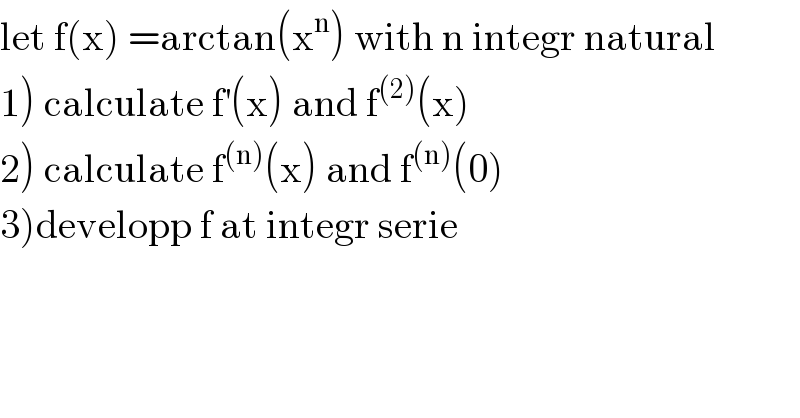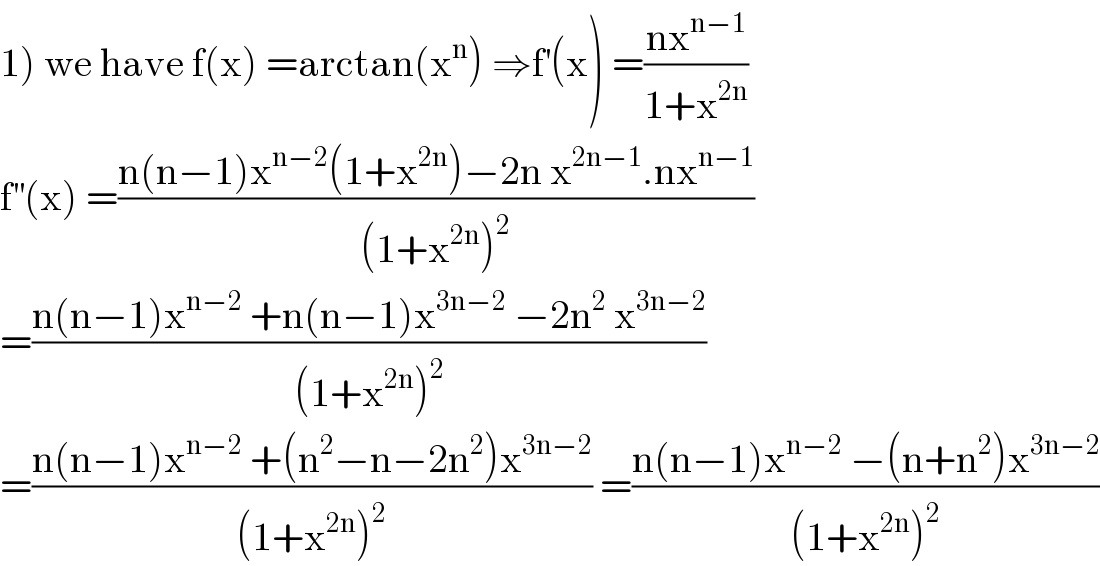
Question and Answers Forum
Previous in Relation and Functions Next in Relation and Functions
Question Number 96593 by mathmax by abdo last updated on 03/Jun/20

Answered by mathmax by abdo last updated on 03/Jun/20

Answered by mathmax by abdo last updated on 03/Jun/20
![2)we have f^′ (x) =((nx^(n−1) )/(1+x^(2n) )) poles of f^(′?) x^(2n) +1 =0 ⇒x^(2n) =e^(i(2k+1)π) ⇒x_k =e^(i(((2k+1)π)/(2n))) k∈[[0,2n−1]] ⇒f^′ (x) =((nx^(n−1) )/(Π_(k=0) ^(2n−1) (x−x_k ))) =Σ_(k=0) ^(2n−1) (a_k /(x−x_k )) , a_k =((nx_k ^(n−1) )/(2n x_k ^(2n−1) )) =(1/2)×(x_k ^n /((−1))) =−(1/2) e^(i(((2k+1)π)/2)) ⇒f^′ (x) =−(1/2) Σ_(k=0) ^(2n−1) (e^(i(((2k+1)π)/2))) /(x−x_k )) ⇒ f^((p)) (x) =−(1/2) Σ_(k=0) ^(2n−1) e^(i(πk +(π/2))) {(1/(x−x_k ))}^((p−1)) =−(1/2)Σ_(k=0) ^(2n−1) i(−1)^k ×(((−1)^(p−1) (p−1)!)/((x−x_k )^p )) =((i(−1)^p (p−1)!)/2) Σ_(k=0) ^(2n−1) (((−1)^k )/((x−x_k )^p )) p=n ⇒f^((n)) (x) =(i/2)(−1)^n (n−1)!Σ_(k=0) ^(2n−1) (((−1)^k )/((x−x_k )^n )) f^((n)) (0) =(i/2)(−1)^n (n−1)! Σ_(k=0) ^(2n−1) (((−1)^k )/((−1)^n x_k ^n )) =(i/2)(n−1)! Σ_(k=0) ^(2n−1) (((−1)^k )/(i(−1)^k )) =(1/2) Σ_(k=0) ^(2n−1) (1) =n ⇒f^((n)) (0) =n](Q96662.png)
Commented by mathmax by abdo last updated on 03/Jun/20

